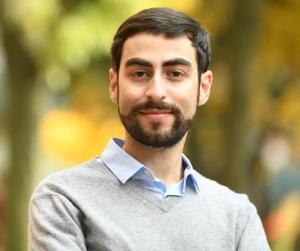ESP Biography
BENJAMIN RUDSHTEYN, Columbia Postdoc in Computational Chemistry
|
Major: Chemistry College/Employer: Columbia University Year of Graduation: Not available. |

|
Brief Biographical Sketch:
I am currently a NIH Postdoctoral Research Fellow in Richard Friesner's group in the Chemistry Department at Columbia University using Auxiliary Field Quantum Monte Carlo to study transition metal containing systems. I hold a B.S. degree in chemistry from Macaulay Honors College program at Brooklyn College/CUNY (2013) and a Ph.D. in computational/physical chemistry from Yale University (2018). Past Classes(Clicking a class title will bring you to the course's section of the corresponding course catalog)S974: Introduction to Computer-Aided Drug Design in Splash Spring 2021 (Mar. 20, 2021)
This course is a brief introduction to computer-aided drug design (CADD) which uses the tools of computational chemistry and data science to aid the process of drug discovery and how almost everything you learned about the lock and key model of protein-ligand binding is wrong. Concepts include, but are not limited to, the drug discovery pipeline and associated costs, Lipinski's rule of five, structure-function relationships, hit Identification, lead optimization, ligand-based vs. structure-based design, high-throughput virtual screening, agonist vs. antagonist, decoys, selectivity and side effects, allosteric interactions, assays, and more advanced computational methods.
S975: Introduction to Computational Chemistry in Splash Spring 2021 (Mar. 20, 2021)
Computational chemistry is the branch of chemistry that uses computers to solve equations from quantum mechanics to solve problems in chemistry such as predicting the structure, properties, and patterns of reactivity of molecules. This course will be a very math-lite survey of what computational chemistry is about and the fundamental balance of computational expediency and accuracy.
S917: The Unscientific Method: Challenges Facing Science As A Discipline in Splash Fall 2020 (Nov. 07, 2020)
This class gives an overview of challenges facing science as a discipline. We’ll discuss how the Scientific Method should work and how it should plays out in practice in terms of topics such as the the following:
Publishing
Peer review
Plagiarism
Scientific misconduct
Public relations
Unconscious bias
Reproducibility
S919: Introduction to Computational Chemistry in Splash Fall 2020 (Nov. 07, 2020)
Computational chemistry is the branch of chemistry that uses computers to solve equations from quantum mechanics to solve problems in chemistry such as predicting the structure, properties, and patterns of reactivity of molecules. This course will be a very math-lite survey of what computational chemistry is about and the fundamental balance of computational expediency and accuracy.
S817: Chemophobia: What's a Chemical? in Splash Fall 2019 (Oct. 27, 2019)
This class gives an overview of the phenomenon of chemophobia, the fear of chemicals (not of organic chemistry as a class!). It will define the terminology of chemicals, including the difference between natural and artificial chemicals and how one is not necessarily better than the other.
S818: Introduction to Solar Fuels in Splash Fall 2019 (Oct. 27, 2019)
Introduction to the use of solar fuels to solve pressing climate change problems. Topics of interest include climate change, solar cells, conversion of water to hydrogen, conversion of carbon dioxide to fuels, conversion of nitrogen to ammonia,, and how chemistry, particularly computational chemistry, are used to solve these challenge
S819: Everything you wanted to know about being a scientist, but were too afraid to ask in Splash Fall 2019 (Oct. 27, 2019)
This course will walk students through what it is like to be a scientist and the necessary training (undergraduate, graduate, postdoctoral) and the various career options available.
S729: Chemophobia: What's a Chemical? in Splash Fall 2018 (Oct. 28, 2018)
This class gives an overview of the phenomenon of chemophobia, the fear of chemicals (not of organic chemistry as a class!). It will define the terminology of chemicals, including the difference between natural and artificial chemicals and how one is not necessarily better than the other.
S730: Introduction to Solar Fuels in Splash Fall 2018 (Oct. 28, 2018)
Introduction to the use of solar fuels to solve pressing climate change problems. Topics of interest include climate change, solar cells, conversion of water to hydrogen, conversion of carbon dioxide to fuels, conversion of nitrogen to ammonia,, and how chemistry, particularly computational chemistry, are used to solve these challenge
|
|
